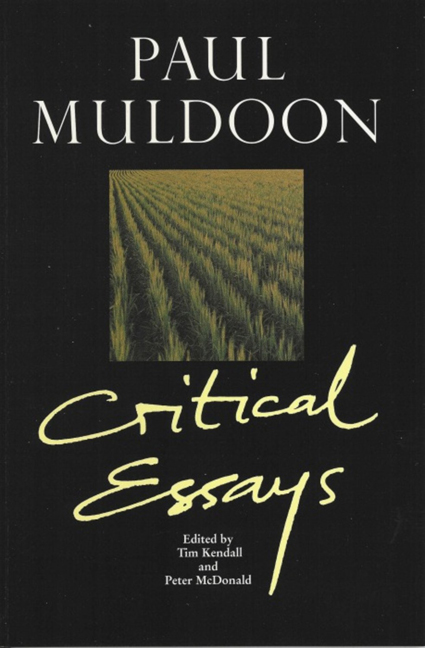Book contents
- Frontmatter
- Contents
- Acknowledgements
- Notes on Contributors
- Introduction
- ‘Thirteen or Fourteen’: Paul Muldoon's Poetics of Adolescence
- Never Quite Showing his Hand: Robert Frost and Paul Muldoon
- For Father Read Mother: Muldoon's Antecedents
- Pax Hibernica/Pax Americana: Rhyme and Reconciliation in Muldoon
- Muldoon and Pragmatism
- ‘All That’: Muldoon and the Vanity of Interpretation
- Paul Muldoon's Transits: Muddling Through after Madoc
- ‘All Art is a Collaboration’: Paul Muldoon as Librettist
- Muldoon's Remains
- Index
Paul Muldoon's Transits: Muddling Through after Madoc
- Frontmatter
- Contents
- Acknowledgements
- Notes on Contributors
- Introduction
- ‘Thirteen or Fourteen’: Paul Muldoon's Poetics of Adolescence
- Never Quite Showing his Hand: Robert Frost and Paul Muldoon
- For Father Read Mother: Muldoon's Antecedents
- Pax Hibernica/Pax Americana: Rhyme and Reconciliation in Muldoon
- Muldoon and Pragmatism
- ‘All That’: Muldoon and the Vanity of Interpretation
- Paul Muldoon's Transits: Muddling Through after Madoc
- ‘All Art is a Collaboration’: Paul Muldoon as Librettist
- Muldoon's Remains
- Index
Summary
Making good use of the playful-plain style that characterizes his most everyday book – his verse journal for January 1992, The Prince of the Quotidian – Paul Muldoon grumbles:
In the latest issue
of the TLS ‘the other Seamus’, Seamus Deane,
has me ‘in exile’ in Princeton:
this term serves mostly to belittle
the likes of Brodsky or Padilla
and is not appropriate of me; certainly not
of anyone who, with ‘Louisa May’ Walcott,
is free to buy a ticket to his emerald isle
of choice. To Deane I say, ‘I'm not “in exile”,
though I can't deny
that I've been twice in Fintona’.
To be fair to Deane – as Muldoon isn't, quite – the offending TLS piece is an imaginary dialogue between Joyce and Yeats in which the two look for signs of the persistence of their favourite motifs and techniques in contemporary Irish literature. It is thus with a degree of calculated anachronism that Deane's Yeats announces that Muldoon, Derek Mahon, John Montague and Brian Moore ‘keep up some of our most hallowed traditions. Exile, for instance.’
The experience of exile and, even more, the idea of it, were integral to literary modernism from Ezra Pound to Basil Bunting, through the interwar Americans known as ‘the lost generation’. For Irish writers of this period, expatriation had special attractions. In Paris, Trieste, or the cosmopolitan circuits of diplomacy (to think of Denis Devlin), they could escape the dependency of West Britonism and the claustrophobia of cultural nationalism. Yet being elsewhere was so compatible with Irishness that it could also serve to confirm it. From the Flight of the Earls in 1607, through the continental exile of the eighteenth-century Catholic gentry, and the emigration of the peasantry after the Famine, the experience and idea of leaving Ireland had been integral to being Irish.
Most poets would relish being mentioned in the TLS by Yeats, so why is Muldoon so tetchy? In part, no doubt, because of the politics implicit in a list of ‘exiles’ who are – in Deane's words – ‘Northerners all’.
- Type
- Chapter
- Information
- Paul MuldoonCritical Essays, pp. 125 - 149Publisher: Liverpool University PressPrint publication year: 2004



